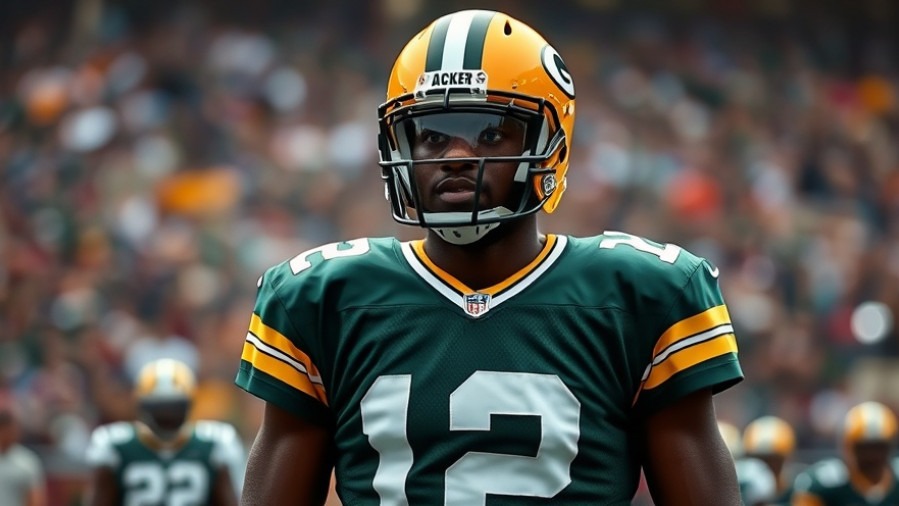
The NFL's Officiating Dilemma: Are Defenses Getting a Raw Deal?
In the ever-evolving landscape of the NFL, one topic that never seems to fade is the officiating system and its perceived biases. Most recently, Dallas Cowboys linebacker Micah Parsons voiced his frustrations over how the league officiates games during a practice session. He expressed that the current rules seem to favor offensive play, hinting that there’s a disconnect between what fans want to see and what the referees are enforcing on the field. Parsons stated, "They'll call defensive holding, but they won't call offensive holding"—a bold claim questioning the integrity of football officiating.
In 'Micah Parsons GOES OFF on NFL officiating', the discussion dives into officiating biases, exploring key insights that sparked deeper analysis on our end.
Understanding the Economics Behind NFL Officiating
Parsons's criticisms raise the question: Is the bias towards offense merely a case of good business? It’s true that fans are generally more entertained by high-scoring games rather than nail-biting defensive standoffs. As ESPN commentator Cam Newton highlighted, a 37-34 game excites viewers much more than a 10-7 game. But does making the game easier on defenses undermine the integrity of the sport? Newton argues that allowing defenses to play freely could lead to an equally thrilling experience, where both sides shine.
The Cost of Changing Rules for Offense
For any fan of the game, the ramifications of officiating decisions can be heart-wrenching. Stephen A. Smith of ESPN emphasized how changes to rules often occur as a reaction to key player injuries—for example, when a star like Tom Brady misses a season due to a low hit, the league quickly enacts protections against such hits. While these rules protect marquee players, they sometimes come at the expense of defensive players who face increasing difficulty in making plays without risking penalties.
The Impact of Referee Decisions on Playoffs and Super Bowl 2025
A glaring example of officiating impacting a critical game comes to mind: the infamous ‘Des caught it’ debate during the playoffs—a decision that not only affected the Dallas Cowboys' championship ambitions but also sparked a national conversation on officiating transparency. Such games resonate with fans and players alike, and as the league heads towards Super Bowl 2025, these discussions feel more pertinent than ever. Can the officiating system hold up? Or will it become a larger narrative in the lead-up to the grand finale?
CD Lamb's Return: A Double-Edged Sword?
On another note, the Dallas Cowboys are set to welcome back Pro Bowl receiver CeeDee Lamb from injury for their upcoming game against the Washington Commanders. His return is highly anticipated, but it also raises questions about the dynamics within the receiving corps. Will Lamb's presence overshadow the flourishing talents of emerging stars like George Pickens? As discussed by several commentators, individual egos in the locker room may play a substantial role in how the team performs. As Lamb re-establishes himself, it’s essential for quarterback Dak Prescott to balance distributing the ball effectively without forcing targets out of necessity.
Navigating Expectations: Dak Prescott’s New Normal
For Prescott, adjusting to Lamb's return means maintaining the rhythm he developed in Lamb's absence. Following a string of impressive performances, he must continue to prioritize reading the defense rather than capitulating to the allure of throwing to his most talented receiver simply because he’s available. This could be the secret sauce that elevates the Cowboys’ offense while also keeping emerging players actively involved, thus avoiding jealousy or clashes over touches.
Moving Forward: Finding Common Ground in Officiating and Talent Management
As discussions about officiating continue to circulate with the excitement of college football scores and NFL highlights, it becomes imperative for players, coaches, and fans alike to push for a system that honors both defensive and offensive contributions. While fans undoubtedly love the spin and glitz of offensive fireworks, the desire for defensive prowess and fair play must not be relegated to the sidelines. The NFL stands at a crossroads; only time will tell whether they choose to prioritize the spectacle of scoring or the gritty, hard-fought battles that characterize true football.
 Add Element
Add Element  Add Row
Add Row 



Write A Comment